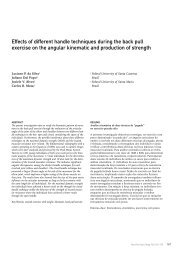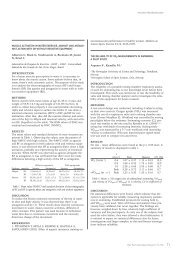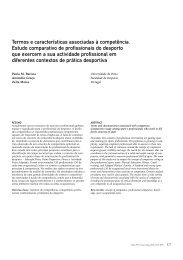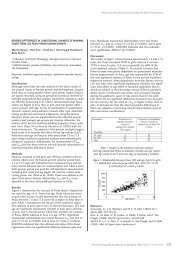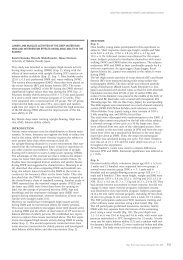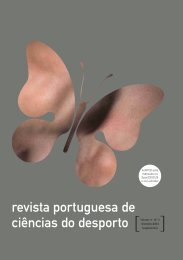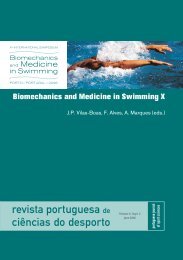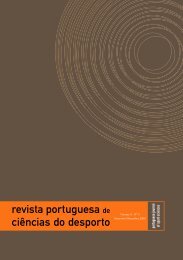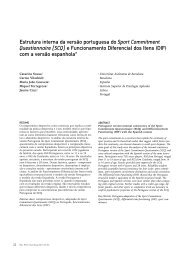35754-Revista FCDEF - Faculdade de Desporto da Universidade do ...
35754-Revista FCDEF - Faculdade de Desporto da Universidade do ...
35754-Revista FCDEF - Faculdade de Desporto da Universidade do ...
Create successful ePaper yourself
Turn your PDF publications into a flip-book with our unique Google optimized e-Paper software.
em diferentes mo<strong>da</strong>li<strong>da</strong><strong>de</strong>s. Tal <strong>de</strong>corre, particularmente <strong>do</strong><br />
facto <strong>de</strong> não ser consistente a ocorrência <strong>de</strong> progressos significativos<br />
quan<strong>do</strong> as condições <strong>de</strong> realização estão sujeitas a uma<br />
interferência contextual eleva<strong>da</strong>, apanágio <strong>do</strong>s envolvimentos<br />
<strong>do</strong> jogo, na sua versão formal (Brady, 1997; Farrow e<br />
Maschette, 1997; Hebert et al., 1996).<br />
Mais recentemente, a realização <strong>de</strong> estu<strong>do</strong>s nos quais a estruturação<br />
<strong>da</strong>s tarefas <strong>de</strong>sportivas integra condições <strong>de</strong> realização<br />
sujeitas a interferência contextual mo<strong>de</strong>ra<strong>da</strong>, mostrou resulta<strong>do</strong>s<br />
altamente satisfatórios. Num estu<strong>do</strong> aplica<strong>do</strong> por Landin e<br />
Hebert (1997), no Basquetebol, os praticantes mostraram<br />
níveis <strong>de</strong> evolução superiores quan<strong>do</strong> praticaram tarefas <strong>de</strong><br />
interferência contextual mo<strong>de</strong>ra<strong>da</strong>, o que reitera a necessi<strong>da</strong><strong>de</strong><br />
<strong>da</strong>s tarefas <strong>de</strong> aprendizagem serem estrutura<strong>da</strong>s <strong>de</strong> forma progressiva,<br />
em referência ao jogo.<br />
Do mesmo mo<strong>do</strong>, Mesquita (1998) num estu<strong>do</strong> aplica<strong>do</strong> no<br />
treino em Voleibol, no escalão <strong>de</strong> inicia<strong>do</strong>s feminino, preten<strong>de</strong>u<br />
analisar o efeito diferencia<strong>do</strong>r <strong>da</strong> prática <strong>de</strong> tarefas estrutura<strong>da</strong>s<br />
<strong>de</strong> forma progressiva em referência às exigências coloca<strong>da</strong>s no<br />
jogo 2x2 e <strong>da</strong> informação orienta<strong>da</strong> para critérios <strong>de</strong> execução,<br />
sobre os ganhos na aprendizagem <strong>da</strong>s habili<strong>da</strong><strong>de</strong>s técnicas. Em<br />
termos absolutos, a variável que mais influência exerceu sobre<br />
os ganhos na aprendizagem foi o treino <strong>da</strong>s habili<strong>da</strong><strong>de</strong>s em<br />
situações <strong>de</strong> prática sujeitas a uma interferência contextual<br />
mo<strong>de</strong>ra<strong>da</strong>, patentes nas tarefas com estrutura funcional idêntica<br />
à <strong>do</strong> jogo 2x2. Perante estes resulta<strong>do</strong>s, a autora realça a<br />
necessi<strong>da</strong><strong>de</strong> <strong>do</strong> treino <strong>da</strong>s habili<strong>da</strong><strong>de</strong>s técnicas ser realiza<strong>do</strong> em<br />
tarefas sujeitas a interferência contextual mo<strong>de</strong>ra<strong>da</strong>, integran<strong>do</strong><br />
a lógica acontecimental <strong>do</strong> jogo e a sua estrutura funcional,<br />
como é o caso <strong>do</strong> jogo 2x2 no Voleibol e tarefas motoras afins.<br />
Parece assim encontrar suporte teórico a convicção <strong>de</strong> que a<br />
utilização <strong>de</strong> situações varia<strong>da</strong>s <strong>de</strong> prática, per se, não permite a<br />
obtenção <strong>de</strong> níveis <strong>de</strong> <strong>de</strong>sempenho superiores, se essas situações<br />
não oferecerem algo <strong>de</strong> diferente e estimulante <strong>do</strong> ponto<br />
<strong>de</strong> vista <strong>da</strong> aprendizagem (Lee et al.,1997; Wright e Coady,<br />
1997; Wrisberg, 1991). Ou seja, para que exista consistência<br />
no <strong>do</strong>mínio <strong>de</strong> <strong>de</strong>termina<strong>do</strong> comportamento motor é necessário<br />
que as condições <strong>de</strong> prática integrem variabili<strong>da</strong><strong>de</strong> reitera<strong>da</strong><br />
pelas exigências <strong>do</strong> jogo e sejam edifica<strong>da</strong>s, <strong>de</strong> forma progressiva,<br />
à medi<strong>da</strong> <strong>da</strong> capaci<strong>da</strong><strong>de</strong> <strong>de</strong> resposta <strong>do</strong>s praticantes. Para<br />
isso, a complexi<strong>da</strong><strong>de</strong> não po<strong>de</strong> ser manipula<strong>da</strong> pela diminuição<br />
<strong>da</strong>s exigências na aprendizagem <strong>do</strong>s fun<strong>da</strong>mentos <strong>do</strong> jogo, mas<br />
fun<strong>da</strong>mentalmente pela manipulação <strong>da</strong>s condições <strong>de</strong> prática<br />
(Rink et al., 1996). Tal implica que se controle os envolvimentos<br />
<strong>de</strong> aprendizagem, para que as condições <strong>de</strong> prática sejam<br />
apropria<strong>da</strong>s à capaci<strong>da</strong><strong>de</strong> <strong>de</strong> resposta <strong>do</strong>s praticantes. Não<br />
haven<strong>do</strong> esta preocupação, corre-se o risco <strong>da</strong>s condições situacionais<br />
<strong>de</strong> prática conduzirem à <strong>de</strong>turpação <strong>do</strong>s comportamentos<br />
motores <strong>de</strong>seja<strong>do</strong>s (Rovegno, 1995). A a<strong>de</strong>quação <strong>da</strong>s condições<br />
<strong>de</strong> prática à capaci<strong>da</strong><strong>de</strong> <strong>de</strong> resposta <strong>do</strong> praticante, constitui<br />
a principal justificação <strong>da</strong> utilização <strong>do</strong>s jogos modifica<strong>do</strong>s e<br />
<strong>da</strong>s tarefas que visam a prática <strong>do</strong>s fun<strong>da</strong>mentos, em referência<br />
ao seu significa<strong>do</strong> <strong>de</strong> aplicação no jogo (Griffin et al., 1997).<br />
Em jeito <strong>de</strong> síntese interessa salientar que a selecção e a sistematização<br />
<strong>da</strong>s tarefas motoras, no âmbito <strong>do</strong>s jogos <strong>de</strong>sportivos,<br />
<strong>de</strong>ve assentar prioritariamente nas exigências coloca<strong>da</strong>s<br />
pela competição, na medi<strong>da</strong> em que esta é, por excelência, o<br />
envolvimento situacional em que se aplicam os conteú<strong>do</strong>s táctico-técnicos<br />
(Graça e Mesquita, 2002); a simplificação <strong>da</strong><br />
estrutura complexa <strong>do</strong> jogo passa pela criação <strong>de</strong> níveis <strong>de</strong> dificul<strong>da</strong><strong>de</strong><br />
crescente, que embora mais simples não <strong>de</strong>svirtuam a<br />
sua essenciali<strong>da</strong><strong>de</strong>, assente na asserção <strong>de</strong> que a lógica didácti-<br />
GRUPOS DE INTERESSE<br />
ca está subordina<strong>da</strong> à lógica <strong>do</strong> jogo.<br />
Como conclusão essencial emerge a i<strong>de</strong>ia <strong>de</strong> que a prática<br />
sujeita à interferência contextual mo<strong>de</strong>ra<strong>da</strong> <strong>de</strong>ve estar associa<strong>da</strong><br />
à necessi<strong>da</strong><strong>de</strong> <strong>de</strong> reconstrução <strong>de</strong> planos <strong>de</strong> acção (Graça &<br />
Mesquita, 2002). A activação <strong>do</strong>s processos a<strong>da</strong>ptativos possibilitará<br />
a interpretação imediata <strong>do</strong> inespera<strong>do</strong>, proporcionan<strong>do</strong><br />
a toma<strong>da</strong> <strong>de</strong> <strong>de</strong>cisões atempa<strong>da</strong>s e oportunas (Turner &<br />
Martinek, 1995). Para tal, concorre a estruturação didáctica <strong>do</strong>s<br />
conteú<strong>do</strong>s referencia<strong>da</strong> à concepção holística <strong>da</strong> aprendizagem,<br />
complementa<strong>da</strong> pela construção <strong>de</strong> <strong>de</strong>termina<strong>do</strong>s algoritmos,<br />
reclama<strong>do</strong>s pelas regulari<strong>da</strong><strong>de</strong>s <strong>do</strong> jogo.<br />
Referências bibliográficas<br />
BRADY, F. (1997). Contextual interference and teaching golf<br />
skills. Perceptual and Motor Skills 84: 347-350.<br />
BUCK, M.; HARRISON, J. (1990): An Analysis of Game Play in<br />
Volleyball. Journal of Teaching Physical Education, 10: 38-48.<br />
FARROW, D.; MASCHETTE, W. (1997). The effects of contextual<br />
interference on children learning forehand tennis<br />
groundstrokes. Journal of Human Movement Studies 33: 47-67.<br />
GOODE, S. & MAGILL, R.A. (1986): Contextual interference<br />
effects in learning three Badminton serves. Research Quarterly<br />
for Exercise and Sport, 57 (4): 308-314.<br />
GRAÇA, A. & MESQUITA, I. (2002): A investigação sobre o<br />
ensino <strong>do</strong>s jogos <strong>de</strong>sportivos: ensinar e apren<strong>de</strong>r as habili<strong>da</strong><strong>de</strong>s<br />
básicas <strong>do</strong> jogo. <strong>Revista</strong> Portuguesa <strong>de</strong> Ciências <strong>do</strong> <strong>Desporto</strong>,<br />
5(2): 67-79.<br />
GRIFFIN, L; MITCHELL, S. & OSLIN, J. (1997). Teaching sport<br />
concepts and skills: a tactical games approach. Champaign, Illinois:<br />
Human Kinetics Publishers.<br />
HEBERT, E.P.; LANDIN, D.; SOLMON, M.A. (1996). Practice<br />
schedule effects on the performance and learning of low- and<br />
high-skilled stu<strong>de</strong>nts: An applied study. Research Quarterly for<br />
Exercise and Sport 67: 52-58.<br />
LANDIN, D. & HEBERT, E. (1997). A comparison of three<br />
practice schedules along the contextual interference continuum.<br />
Research Quarterly for Exercise and Sport, 68: 357-361.<br />
LEE, T.D. & MAGILL, R.A. (1983). Activity during the post-kr<br />
interval: Effects upon performance or learning? Research<br />
Quarterly for Exercise and Sport 54: 340-345.<br />
LEE, T.D.; WISHART, L.R.; CUNNINGHAM, S.; CARNAHAN,<br />
H. (1997). Mo<strong>de</strong>led timing information during ran<strong>do</strong>m practice<br />
eliminates the contextual interference effect. Research<br />
Quarterly for Exercise and Sport, 68(1):100-105.<br />
LIDOR, R.L. (1995): The implementation of constant and<br />
variable - pratices in skill acquisition: a field study.<br />
International Journal of Physical Education, XXXII (4): 11-16.<br />
MESQUITA, I. (1998). A instrução e a estruturação <strong>da</strong>s tarefas no<br />
treino <strong>de</strong> Voleibol: Estu<strong>do</strong> experimental no escalão <strong>de</strong> inicia<strong>do</strong>s<br />
Feminino. Tese <strong>de</strong> Doutoramento. Universi<strong>da</strong><strong>de</strong> <strong>do</strong> Porto,<br />
<strong>Facul<strong>da</strong><strong>de</strong></strong> <strong>de</strong> Ciências <strong>do</strong> <strong>Desporto</strong> e <strong>de</strong> Educação Física.<br />
(não publica<strong>do</strong>).<br />
MESQUITA, I. & GRAÇA, A. (2002). A perspectiva construtivista<br />
<strong>da</strong> aprendizagem no ensino <strong>do</strong>s jogos <strong>de</strong>sportivos colectivos.<br />
In Cultura e Contemporanei<strong>da</strong><strong>de</strong> na educação física e no <strong>de</strong>sporto.<br />
E agora? Edição Especial <strong>do</strong> 9º Congresso <strong>de</strong> Educação<br />
Física e Ciências <strong>do</strong> <strong>Desporto</strong> <strong>do</strong>s Países <strong>de</strong> Língua<br />
Portuguesa, 133-139.<br />
RINK, J.; FRENCH, K.; TJEERDSMA, B.L. (1996). Foun<strong>da</strong>tions<br />
for the learning and instruction of sport and games. Journal of<br />
Teaching Physical Education, 15: 399-417.<br />
ROVEGNO, I. (1995). Theoretical perspectives on knowledge<br />
<strong>Revista</strong> Portuguesa <strong>de</strong> Ciências <strong>do</strong> <strong>Desporto</strong>, 2004, vol. 4, nº 2 (suplemento) [15–102] 77



